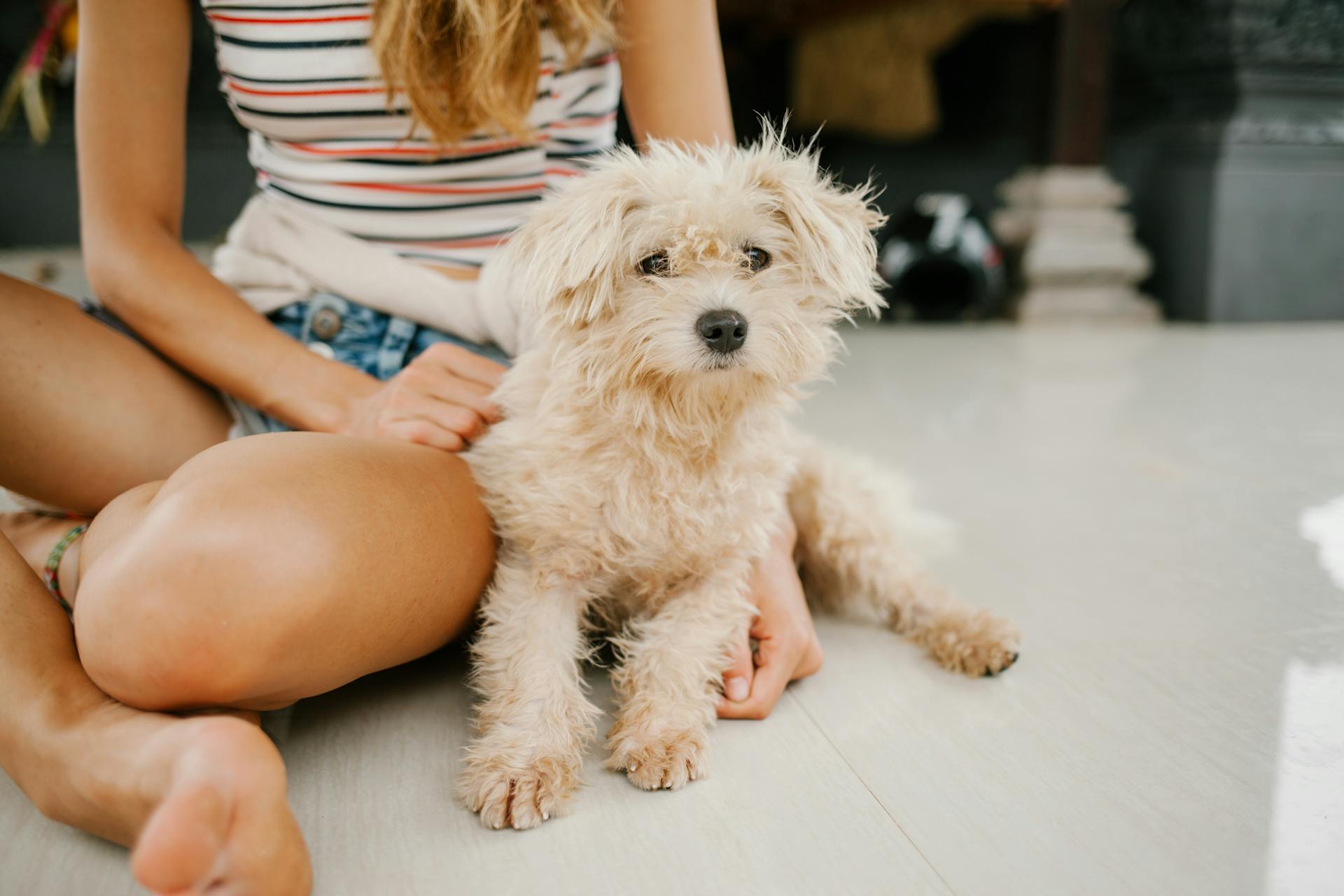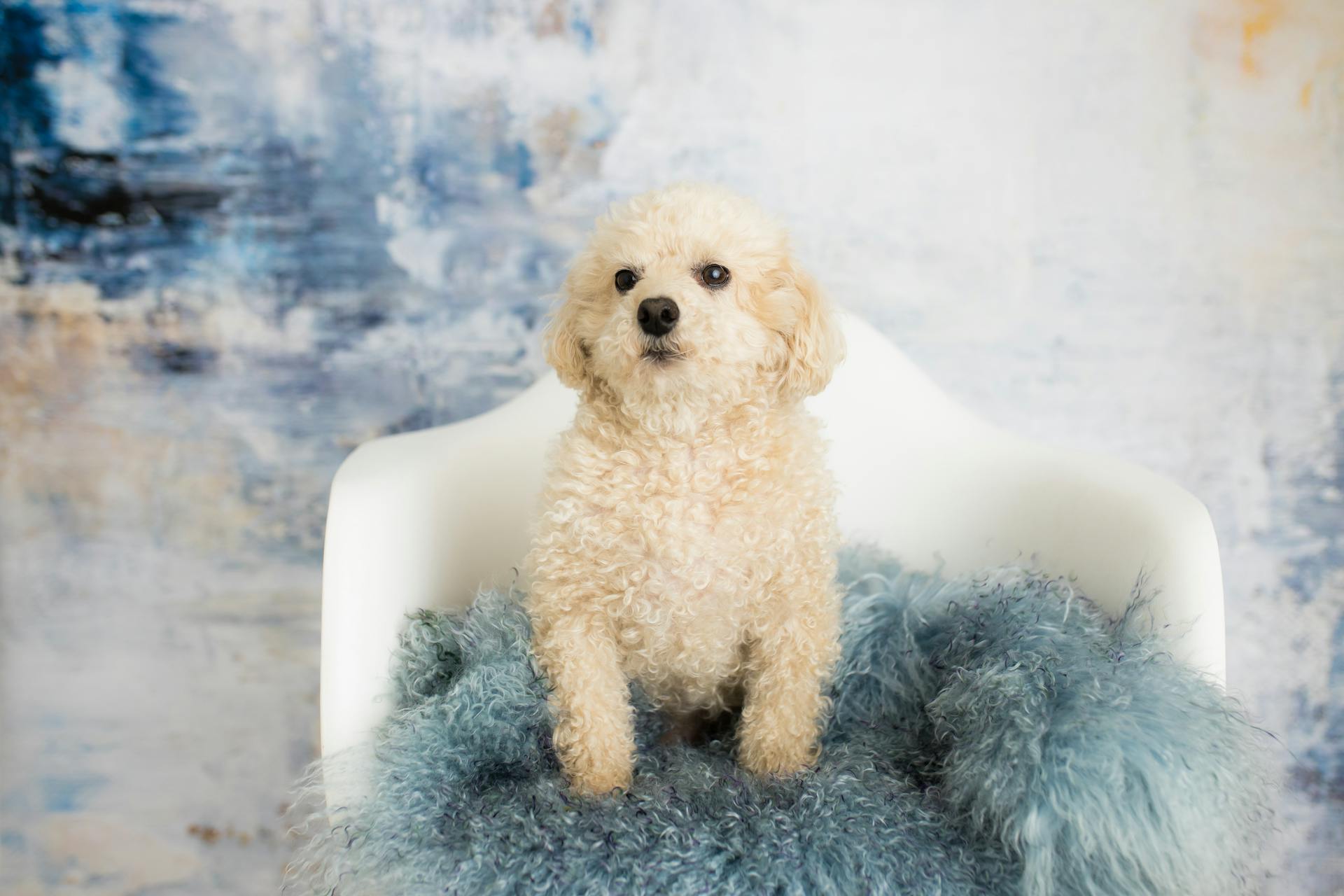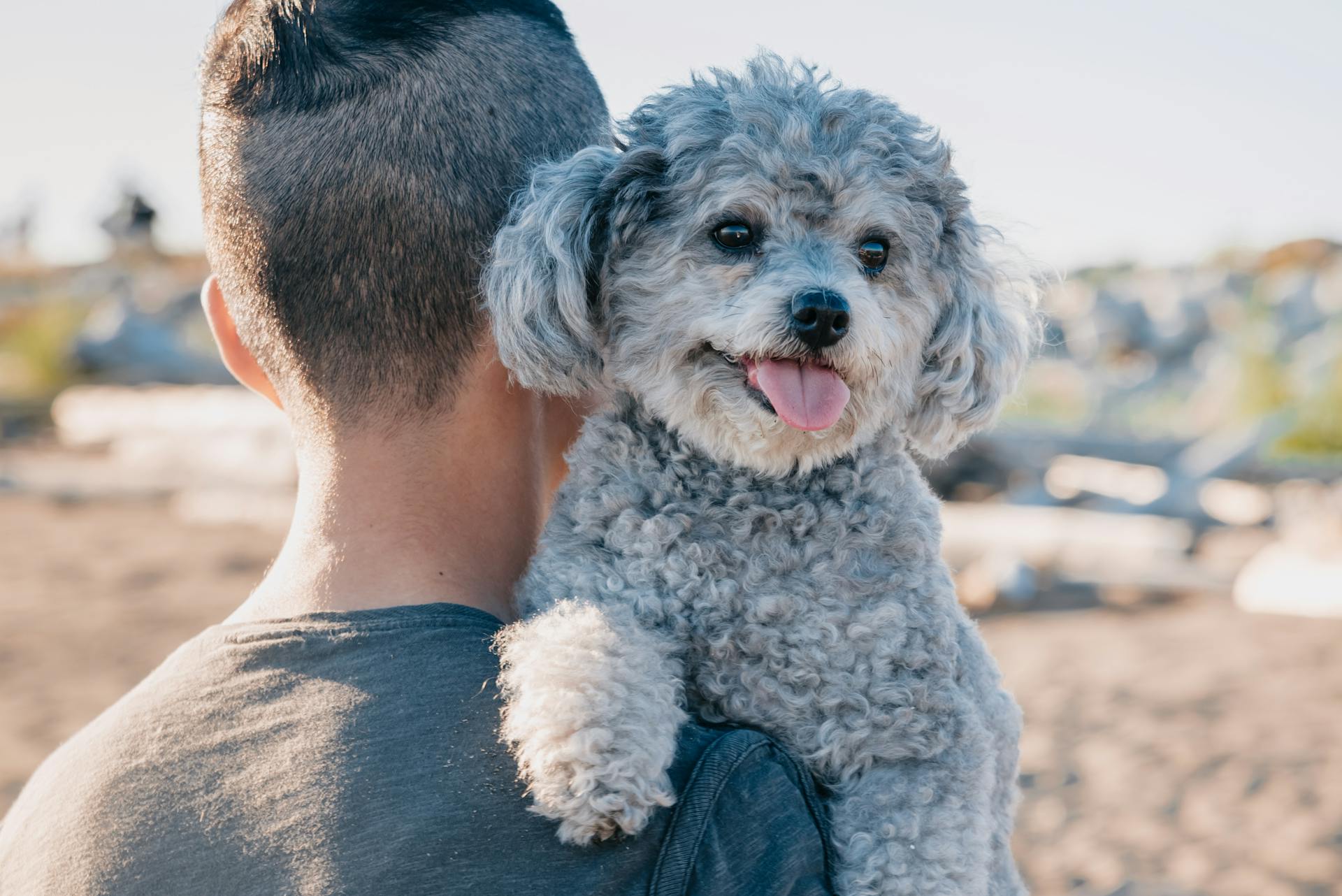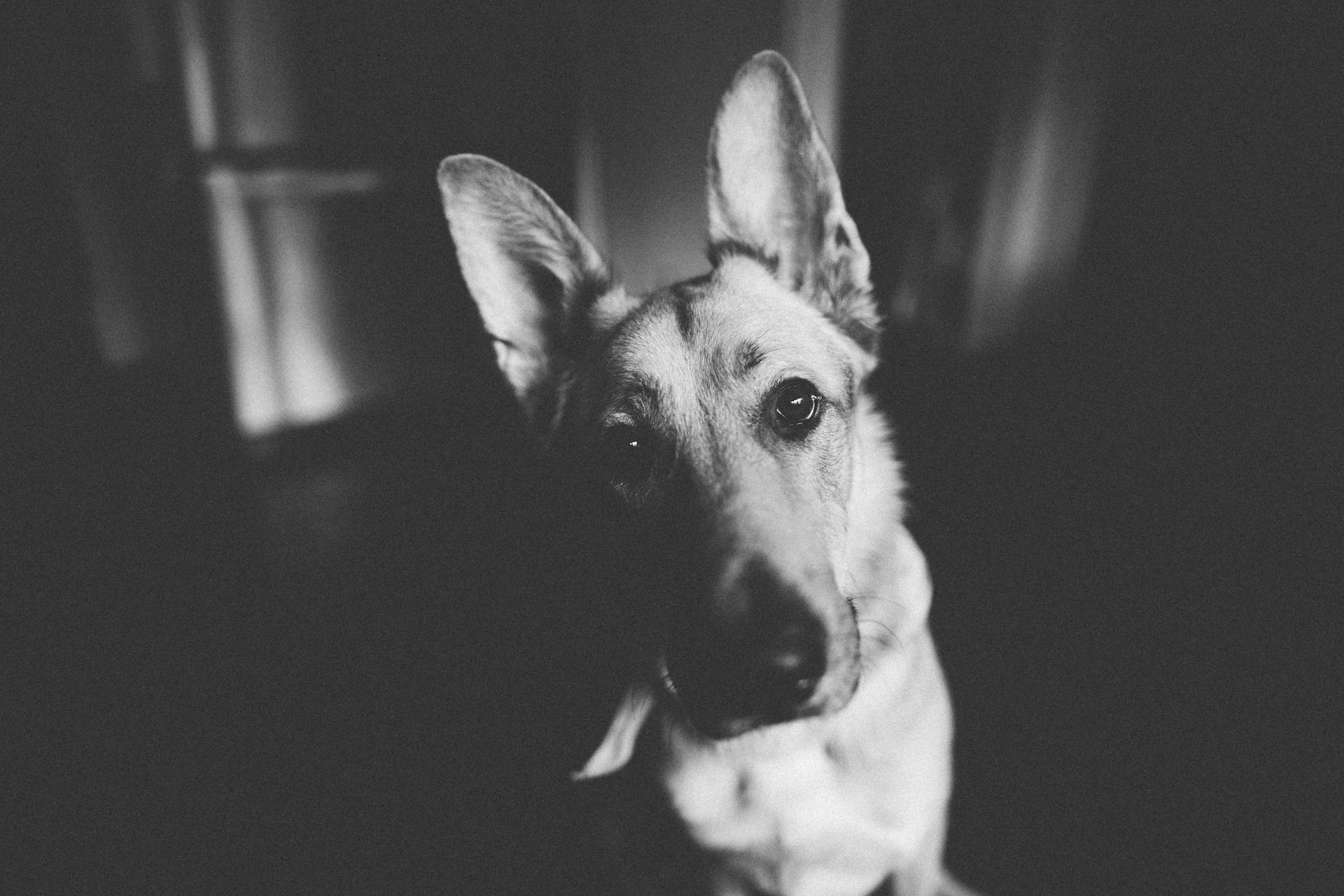
Miniature poodles are intelligent and active dogs that require regular exercise and mental stimulation to prevent boredom and destructive behavior. They need at least 30 minutes of exercise per day.
Housebreaking a miniature poodle requires patience and consistency, as they can be slow to learn. It's essential to establish a routine and reward good behavior.
Miniature poodles are known for their low-shedding coat, which requires regular grooming to prevent matting and tangling. They need to be brushed several times a week.
With proper training and care, miniature poodles can thrive in a variety of living situations, from apartments to homes with yards.
Training and Socialization
Training and socialization are crucial aspects of miniature poodle care. Early socialization is essential to help them become well-rounded and adaptable adults.
For miniature poodles, early socialization is key to reducing future anxieties. Introducing them to a variety of people, animals, and environments during puppyhood is vital. This helps them become confident and calm in new situations.
Regular, short, and fun training sessions are essential for encouraging learning and retention. Use of treats and praise as incentives for good behavior is also effective. A gentle approach that resonates with their sensitive disposition is recommended.
Miniature poodles are intelligent and eager to please, making training relatively easy. However, consistency is still necessary. Aim for one or two training sessions per day, each lasting about 5 to 10 minutes.
To create a positive living environment, consider the following:
- Ample affection and care to reassure them of their cherished status in the family
- Opportunities for socialization to build confidence and help them become well-adjusted pets
- Consideration to prevent loneliness, since these companionable dogs are prone to separation anxiety
Basic Commands and Behavior
Training your Miniature Poodle is a joy, thanks to their inherent intelligence and eagerness to please their owners. They respond particularly well to positive reinforcement.
To start, you'll want to teach them basic commands like "Sit", "Stay", "Come", and "Heel". For example, to teach "Sit", lure them with a treat held close to their nose and then raise it slowly. As their gaze follows the treat, they'll naturally sit.
Here's a quick rundown of how to train each of these basic commands:
Remember to always wrap up training sessions on a high note, as this will foster eagerness for future training and strengthen their association of training with positivity.
Mental and Physical Stimulation
Miniature poodles are highly intelligent and require consistent mental engagement to prevent boredom and behavioral issues. They thrive on interactive toys that dispense treats or challenge them mentally, making them great for indoor activities.
Their keenness to learn makes teaching them new tricks an enjoyable activity. In fact, they can learn a new trick in no time.
Miniature poodles are high-energy breeds that require daily walks and playtime to keep them active and engaged. A good rule of thumb is to have at least two walks a day, each lasting at least 15 minutes.
Here are some exercise ideas that cater to their intelligent and athletic nature:
- Playing fetch to enhance their agility and speed
- Navigating through agility courses
- Swimming sessions, as their breed is known for being excellent swimmers
Interactive playtime with these easy-to-train poodles not only strengthens your bond but is also essential for their overall well-being. By incorporating a mix of physical exertion and mental stimulation, you can help manage their energy levels and keep them sharp and engaged.
Training and Care
Miniature Poodles are intelligent and eager to please, making training a relatively smooth process. Establish a routine with regular feeding times and predictable potty times, as they'll soon associate certain times with needing to go.
To train your Miniature Poodle, stick to positive reinforcement and minimize distractions. Aim for one or two 5-10 minute training sessions per day, using treats and praise as incentives for good behavior. A gentle approach is essential, as they have a sensitive disposition.
Consistency is key in training your Miniature Poodle. Regular, short, and fun training sessions will encourage learning and retention. You can use the following tips to keep your training sessions engaging:
- Use treats and praise as incentives for good behavior
- Keep training sessions short and fun
- Use a gentle approach that resonates with their sensitive disposition
Potty Training Tips
Potty training is a crucial aspect of dog care, and for Miniature Poodles, it's particularly important to establish a routine. Regular feeding times will lead to predictable potty times, so try to stick to a schedule.
Miniature Poodles, like most dogs, benefit from routines, and this includes regular feeding times. Typically, they’ll need to go right after waking, post meals, and before bedtime.
Explore further: How to Train Maltese Puppies Potty Training
Consistency is key when it comes to selecting a spot for your Miniature Poodle to do their business. Whether you opt for an indoor pee pad or an outdoor spot, they'll soon relate this place with doing their business.
If your Miniature Poodle has an accident, it's essential to manage the situation calmly. A gentle "Oops!" and directing them to the right spot is enough. Punishing them can cause fear and hinder the training process.
Here are some key steps to follow:
- Establish a routine with regular feeding times.
- Select a consistent spot for your Miniature Poodle to do their business.
- Manage accidents calmly and gently.
- Celebrate success with praise, treats, or a brief play session.
Addressing Behavioral Issues
As you work with your Miniature Poodle, you may encounter some behavioral issues that can be challenging to address. Excessive barking is a common concern, but it can be curbed through training commands like "Quiet" or redirecting their attention to another activity.
To tackle jumping on people, it's essential to train the "Off" or "Down" command, and ensure they sit before getting any attention. This will help them understand that calm behavior is rewarded.
Separation anxiety is another issue that can arise, especially if your Miniature Poodle is extremely attached to you. Creating a routine, providing engaging toys, or even considering a second pet for companionship can help alleviate this.
Here are some common behavioral issues that Miniature Poodles may exhibit, along with some practical solutions:
Health and Nutrition
As you're learning about miniature poodle training, it's essential to consider their health and nutrition needs. Regular vet check-ups and genetic screenings can prevent or delay the onset of certain health conditions.
Maintaining a healthy lifestyle with proper diet and exercise can support overall well-being and stave off some diseases. This includes feeding your miniature poodle a balanced diet that meets their specific needs.
To ensure your miniature poodle gets the nutrients they need, consider the following dietary demands: Key NutrientImportanceHigh-quality proteinSupports overall health and well-beingComplex carbohydratesProvides sustained energyHealthy fatsSupports skin and coat health
Common Health Issues and Prevention

As a responsible dog owner, it's essential to be aware of the common health issues that can affect your Miniature Poodle. Regular vet check-ups and genetic screenings can prevent or delay the onset of certain health conditions.
Maintaining a healthy lifestyle with proper diet and exercise is crucial in supporting your poodle's overall well-being and staving off some diseases. This includes providing a balanced diet and regular exercise to keep your poodle's weight in check.
Some common signs of health issues in Miniature Poodles include heart murmurs, coughing, and exercise intolerance, which can be indicative of Mitral Valve Disease. If you notice any of these symptoms, it's essential to take your poodle to the vet for a cardiac exam.
Early detection is key in preventing or managing many health issues in Miniature Poodles. For example, Addison's Disease can be detected through regular vet visits for adrenal gland check-ups, and stress management can help prevent its onset.

Here are some common health issues that affect Miniature Poodles and their corresponding preventive measures:
By being aware of these common health issues and taking proactive steps to prevent or manage them, you can help your Miniature Poodle live a long, happy, and healthy life.
Nutrition: Feeding Your
Proper nutrition is the cornerstone of a healthy, vibrant life for your dog.
Selecting a diet that meets your pet's specific needs is crucial, as different breeds have unique nutritional demands.
Miniature Poodles require a diet that is tailored to their size and energy level, with a focus on precision and care.
With a myriad of dog food options available, it's essential to choose a high-quality food that is formulated to meet your Miniature Poodle's specific needs.
Feeding your Miniature Poodle a balanced diet that includes a mix of protein, fat, and complex carbohydrates will help keep them healthy and vibrant.
A diet that is rich in nutrients and low in fillers and by-products will help support your Miniature Poodle's overall health and well-being.
By selecting the right food and feeding your Miniature Poodle with precision and care, you can help them live a long, healthy, and happy life.
Developmental Stages
Understanding the developmental stages of a miniature poodle is crucial for effective training. Miniature poodles are considered puppies until they're about 12-18 months old.
At 8-10 weeks, miniature poodles are in the socialization stage, where they learn to interact with their environment and people. This is a critical period for imprinting good behavior.
Between 12-18 months, miniature poodles enter the adolescence stage, marked by increased independence and testing boundaries. Consistent training and socialization are essential during this period to prevent unwanted behaviors.
Twelve Weeks
At about the three-month mark, Toy and Mini Poodles are typically ready to leave for their new homes. They need a little more time with their mother because they're much smaller as puppies.
Their small size and delayed tooth arrival are the main reasons for this extended stay.
Grooming is a key part of development for Poodles, and you'll want to start grooming early. Many breeders will start some type of grooming, like trimming their Poodles' face, around four to six weeks.
Worth a look: Miniature Poodle Grooming
Nail trimming can start as young as three days old to prevent the pup's from scratching mom when they're nursing.
You want to get them used to being groomed from an early age. This will make the experience positive and help them get comfortable with the grooming process.
Go in slow steps, starting with small tasks like clipping their face, then their feet, and finally their tail.
Sixteen Weeks
At 16 to 18 weeks, your puppy is finally ready to venture out into the world. Most dogs have had all their vaccines by this time, making it safe to take them to public spaces like obedience classes.
Your puppy can now go to a pro groomer, but it's essential to choose a professional who knows what trims are suitable for your breed and how to trim their tail or head correctly.
It's crucial to wait until your puppy has had at least up to their 16 weeks shot before taking them out in public. This ensures they're protected against parvo and distemper.
Here are some exciting activities you can now do with your puppy at 16 weeks:
- Take them to obedience classes
- Visit a pro groomer
Remember, your puppy's safety and well-being should always be your top priority.
Twelve Months
At twelve months, your Toy or Mini Poodle is likely to be fully grown, reaching their adult size by their first birthday.
This stage is crucial for their development, as they need to continue getting enough exercise and mental stimulation to maintain their physical and emotional well-being.
A Toy or Mini Poodle should be about fully grown by the time they reach their first birthday.
Discover more: When Is a Miniature Poodle Full Grown
Frequently Asked Questions
At what age do miniature Poodles calm down?
Miniature Poodles typically calm down around the age of 2, marking a significant shift in their behavior. This milestone is a great opportunity to learn more about their development and training needs.
Sources
- https://tinylovingcanines.org/miniature-poodle/how-to-train-a-miniature-poodle/
- https://www.yourpurebredpuppy.com/reviews/miniaturepoodles.html
- https://www.dogster.com/dog-breeds/miniature-poodle
- https://www.articlesfactory.com/articles/animals-and-pets/miniature-poodle.html
- https://www.akc.org/expert-advice/dog-breeds/poodle-puppy-training-timeline-how-to-raise-a-poodle/
Featured Images: pexels.com


